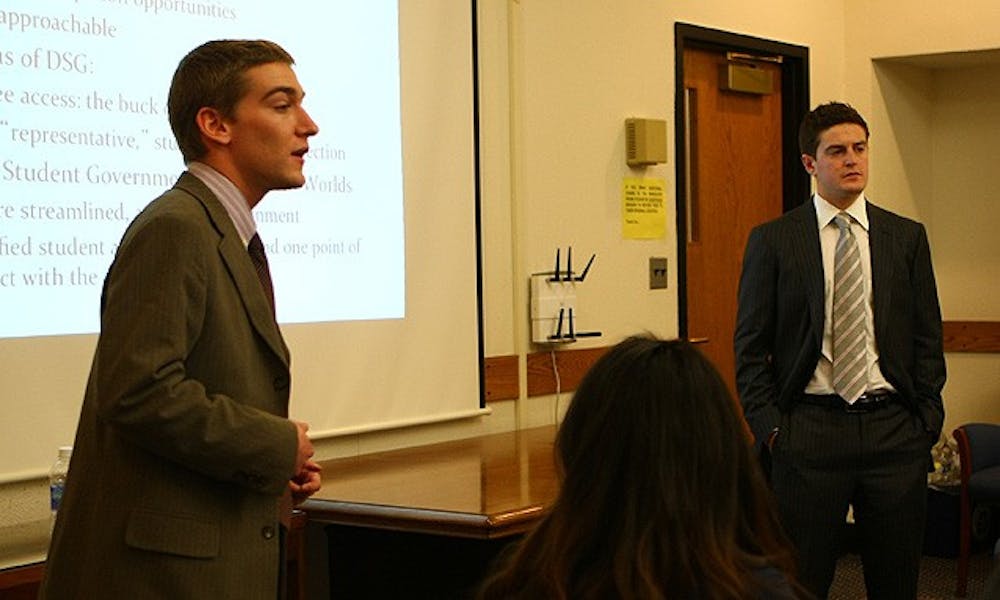Student government at Duke could undergo significant change and consolidation this Spring.
The student body will likely consider a referendum to merge Campus Council with Duke Student Government during the Young Trustee election Feb. 15. Campus Council voted at its meeting yesterday to recommend the proposal, which the DSG Senate will vote on Feb. 8. The council supported the proposal in a 13-9 two-tiered vote with one abstention.
If passed, the referendum will go into effect Fall 2011, said Campus Council President Stephen Temple, a senior.
“It’s becoming increasingly evident that we’ve reached a threshold of overlap,” DSG President Mike Lefevre said in his presentation, noting that this decision will parallel with the recent appointment of Rick Johnson as assistant vice president of housing and dining. “There are two things that are prompting us to act now: the transition to the house model and reform within Duke’s administration.”
Lefevre, a senior, also noted the importance of collaboration, calling the restructuring “the best of both worlds.”
He said the council’s long-standing ad hoc policy, which allows students to work on specific projects of interest at their discretion, and its approachable image will benefit DSG. Likewise, Lefevre noted that DSG’s trustee access and student-body wide election will facilitate more transparency and effective residential policy.
The proposed policy will create a Residence Life and Dining Committee led by a vice president for residence life and dining, Lefevre said. The Facilities and Services Committee, a current Campus Council committee, will become an affiliate committee to DSG yet maintain its autonomy in selecting members and spending on various residential facilities. All campus programming will also most likely become the exclusive responsibility of Duke University Union, a transition to be discussed in the coming weeks, he added.
DSG and the council recommend merging before the house model’s inception in Fall 2012 to allow ample transition time, said council ad hoc Ben Goldenberg, a junior who was instrumental in creating the proposal with Lefevre.
Although plans for the house model are still in development, Goldenberg and Lefevre said it is important that the new government take the lead in shaping the house model, not vice versa.
“I want student government to exist in the most independent structure and whatever house structure, we’ll do with good sense,” Lefevre said in an interview. “Next year, we’ll have some breathing time.”
Under the proposal, each house will have a house council which will form “quad councils” or “neighborhood councils” and will have the ability to plan programming. An unprecedented provision in the proposal also allows quad councils to introduce policies directly to the Senate in the “unusual” case that a council’s designated senator refuses to do so, Lefevre noted.
“No longer will it be a battle for an FSC project to be aligned with an athletics project [in DSG],” Goldenberg said in an interview. “They will be on the same side—there won’t be a clash. On the programmatic side, there won’t be two [events] in the same day—like Dezemberfest and Deck the Plaza—and it’ll be a better use of student resources.”
The proposal to merge Campus Council with DSG was the result of conversations about internal reform of the council which began last Spring, Goldenberg said. Talks of external reform and a possible merger began in September and Goldenberg and other policy committee members officially met with Lefevre and administrators in November.
“The consensus started to grow within some members of exec[utive board] that it would be logical [to merge],” Campus Council Vice President Johnathan Pryor, a senior who is also the council’s policy chair, said in an interview. “Campus Council is an extraordinarily representative and powerful model on paper but there are difficulties with [how] the system has been implemented.”
Pryor said the “pressure” of the Residential Group Assessment Committee process—and the drafting of the Collaborative Housing Process last Spring—were reasons he personally felt the need for reform and a “more effective” student government.
“Power that was given was not necessarily appropriate,” Pryor said. “I was given too much power, especially with RGAC, and the student body recognized that and they were right.”
Moving forward, Temple said he is excited to work with Lefevre and DSG to make the new system strong and viable under the transition to the house model.
“There are certainly going to be things we’re going to have to work through,” he said. “I think it’s a very solid group and we’re going to see a very solid outcome brought before the student body.”
In other business:
Members of the Duke Marketing Club requested funding from the council for the library party. The council allocated $5,000 for the ’60s-themed event to be held Feb. 25 from 9 p.m. to midnight. DMC President Christine Hall, a senior, said the event, “Mad Men and Mad Women,” will feature free giveaways and archival displays from the John W. Hartman Center for Sales, Advertising and Marketing History.
DMC adviser George Grody, visiting associate professor in markets and management studies, also noted that the AMC television series “Mad Men” often consults with Duke’s Hartman Center.
Get The Chronicle straight to your inbox
Signup for our weekly newsletter. Cancel at any time.

